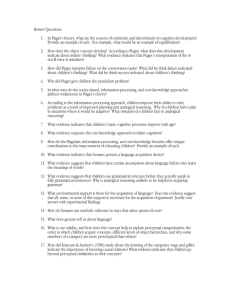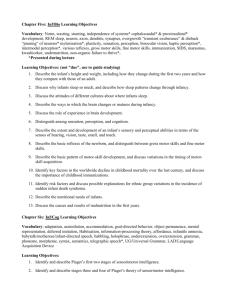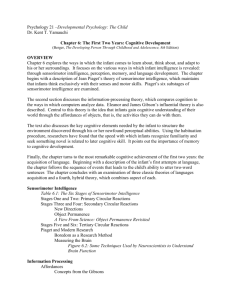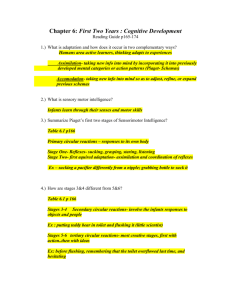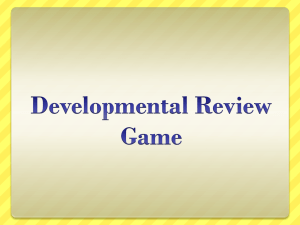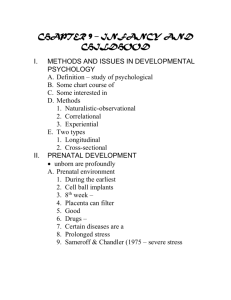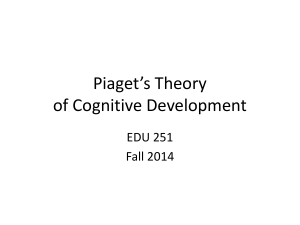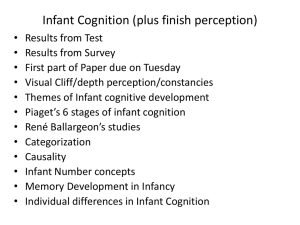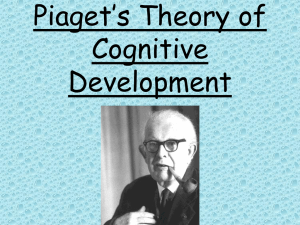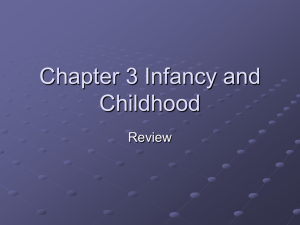Writing Assignments: IN CLASS ESSAYS
advertisement
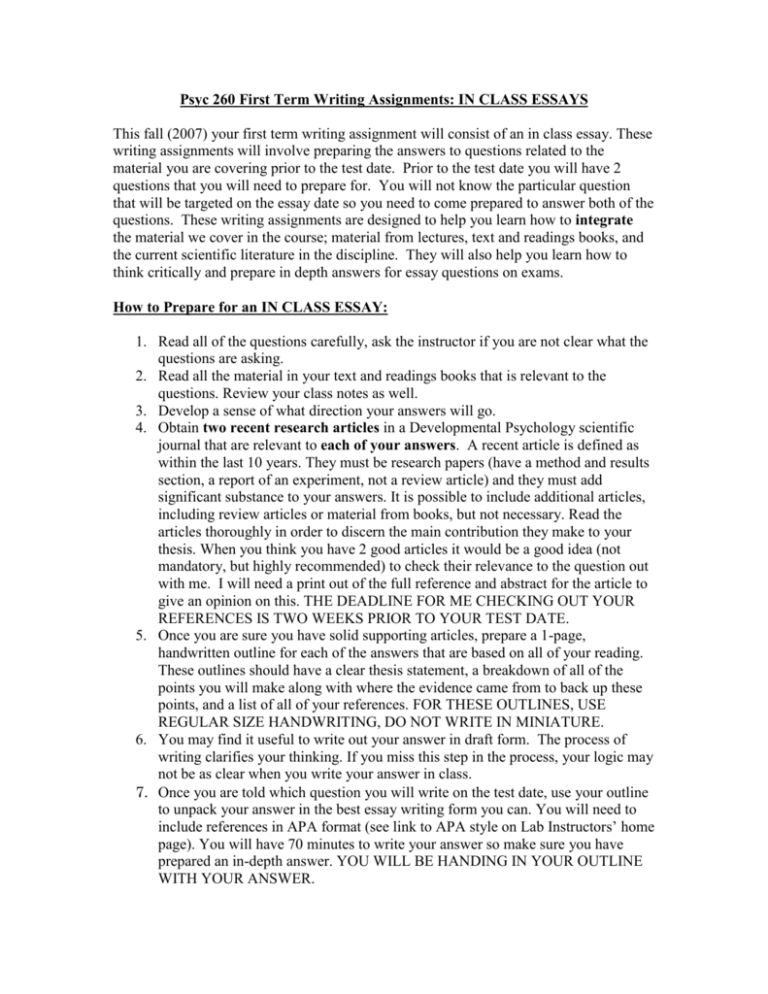
Psyc 260 First Term Writing Assignments: IN CLASS ESSAYS This fall (2007) your first term writing assignment will consist of an in class essay. These writing assignments will involve preparing the answers to questions related to the material you are covering prior to the test date. Prior to the test date you will have 2 questions that you will need to prepare for. You will not know the particular question that will be targeted on the essay date so you need to come prepared to answer both of the questions. These writing assignments are designed to help you learn how to integrate the material we cover in the course; material from lectures, text and readings books, and the current scientific literature in the discipline. They will also help you learn how to think critically and prepare in depth answers for essay questions on exams. How to Prepare for an IN CLASS ESSAY: 1. Read all of the questions carefully, ask the instructor if you are not clear what the questions are asking. 2. Read all the material in your text and readings books that is relevant to the questions. Review your class notes as well. 3. Develop a sense of what direction your answers will go. 4. Obtain two recent research articles in a Developmental Psychology scientific journal that are relevant to each of your answers. A recent article is defined as within the last 10 years. They must be research papers (have a method and results section, a report of an experiment, not a review article) and they must add significant substance to your answers. It is possible to include additional articles, including review articles or material from books, but not necessary. Read the articles thoroughly in order to discern the main contribution they make to your thesis. When you think you have 2 good articles it would be a good idea (not mandatory, but highly recommended) to check their relevance to the question out with me. I will need a print out of the full reference and abstract for the article to give an opinion on this. THE DEADLINE FOR ME CHECKING OUT YOUR REFERENCES IS TWO WEEKS PRIOR TO YOUR TEST DATE. 5. Once you are sure you have solid supporting articles, prepare a 1-page, handwritten outline for each of the answers that are based on all of your reading. These outlines should have a clear thesis statement, a breakdown of all of the points you will make along with where the evidence came from to back up these points, and a list of all of your references. FOR THESE OUTLINES, USE REGULAR SIZE HANDWRITING, DO NOT WRITE IN MINIATURE. 6. You may find it useful to write out your answer in draft form. The process of writing clarifies your thinking. If you miss this step in the process, your logic may not be as clear when you write your answer in class. 7. Once you are told which question you will write on the test date, use your outline to unpack your answer in the best essay writing form you can. You will need to include references in APA format (see link to APA style on Lab Instructors’ home page). You will have 70 minutes to write your answer so make sure you have prepared an in-depth answer. YOU WILL BE HANDING IN YOUR OUTLINE WITH YOUR ANSWER. Psychology 260 Dr. Tara Callaghan Preparation Questions for In Class Essay Assignment Term 1 Test Date: November 12-13, 2007 Question 1. Jean Piaget viewed infancy as the period where the human organism builds knowledge on the basis of sensorimotor interaction with the environment. The crowning glory accomplished at the end of this period was thought to be the capacity of the infant for mental representation. According to Piaget’s view, true mental representation occurs when the infant can keep in mind AND mentally reason about absent objects. This did not occur, according to Piaget, until late in the second year. Piaget tested infant’s ability to mentally represent the world with the object permanence test. There have been challenges to Piaget’s views of object permanence and mental representation. R. Baillargeon looked to new object permanence methods to challenge Piaget’s view of infant’s concept of mental representation. Other researchers, including L. Spelke, R. Baillargeon, L. Oakes, A. Leslie, K. Wynn, also challenged Piaget’s views about what an infant knows about objects. Together, this body of research has transformed our views both of what infants’ initial states of knowledge consist of, and whether and how infants are able to represent that knowledge. In this question, very briefly describe the classic Piagetian perspective on the development of the object concept during infancy and the research findings that support it. Then muster an argument - using the findings from empirical studies – to support the claim that infants’ abilities go beyond what Piaget proposed. Critically examine the contemporary methodologies we use to infer what infants know, and reflect on the advantages of these methods over the Piagetian ones. In your conclusion, discuss how the findings you review relate to the nativist/empiricist debate on the origins of knowledge. In addition to material from the text, lectures, and readings book, use at least 2 research studies from 2 different researchers (listed above) to support you answer. Question 2. Vygotsky claimed that all cognitive development occurs first in interaction with others and then internally in the individual organism. This idea has resonated with many contemporary researchers studying language acquisition. J. Bruner proposed that infants have the perceptual and conceptual ability to form classes and categories of things in the world very early in infancy. When those things of the world are then labeled by adults with whom they are having close social interactions (during everyday social interactions, which he called routines) he claimed that language learning is facilitated. M. Tomasello identified 2 mechanisms that facilitate language acquisition; 1) joint attention episodes that involve verbal labeling, and 2) the ability to understand the intentions behind others’ actions. D. Baldwin argued that in addition to the supports that adults give, infants bring social cognitive skills (especially gaze following) to these early interactions, and these skills help them to disambiguate what the adult is referring to and eventually facilitate language acquisition. A. Bigelow, J. Watson, G. Gergely, and C. Trevarthan have all shown that the infant has a foundational skill of sensistivity to social contingency in interactions with others that assists them in tuning into when it is possible to learn from others. In this question discuss the idea that language development in infants is facilitated by the support of others in early social interactions, but in addition, infants have important social cognitive skills themselves and these skills also prepare them for language learning. In addition to the material from text, lectures and readings book that are relevant to this question, use at least 2 research studies from 2 different researchers (listed above) to support you answer. In your conclusion, discuss how the findings you review relate to the nativist/empiricist debate on the origins of language. *REMEMBER THAT FOR EACH QUESTION YOU MUST INTEGRATE MATERIAL FROM ALL SOURCES (TEXT, LECTURES, READINGS BOOK, OUTSIDE ARTICLES) **REMEMBER THAT A RESEARCH ARTICLE IS ONE WITH A METHOD AND RESULTS SECTION THAT REPORTS A NEW STUDY
